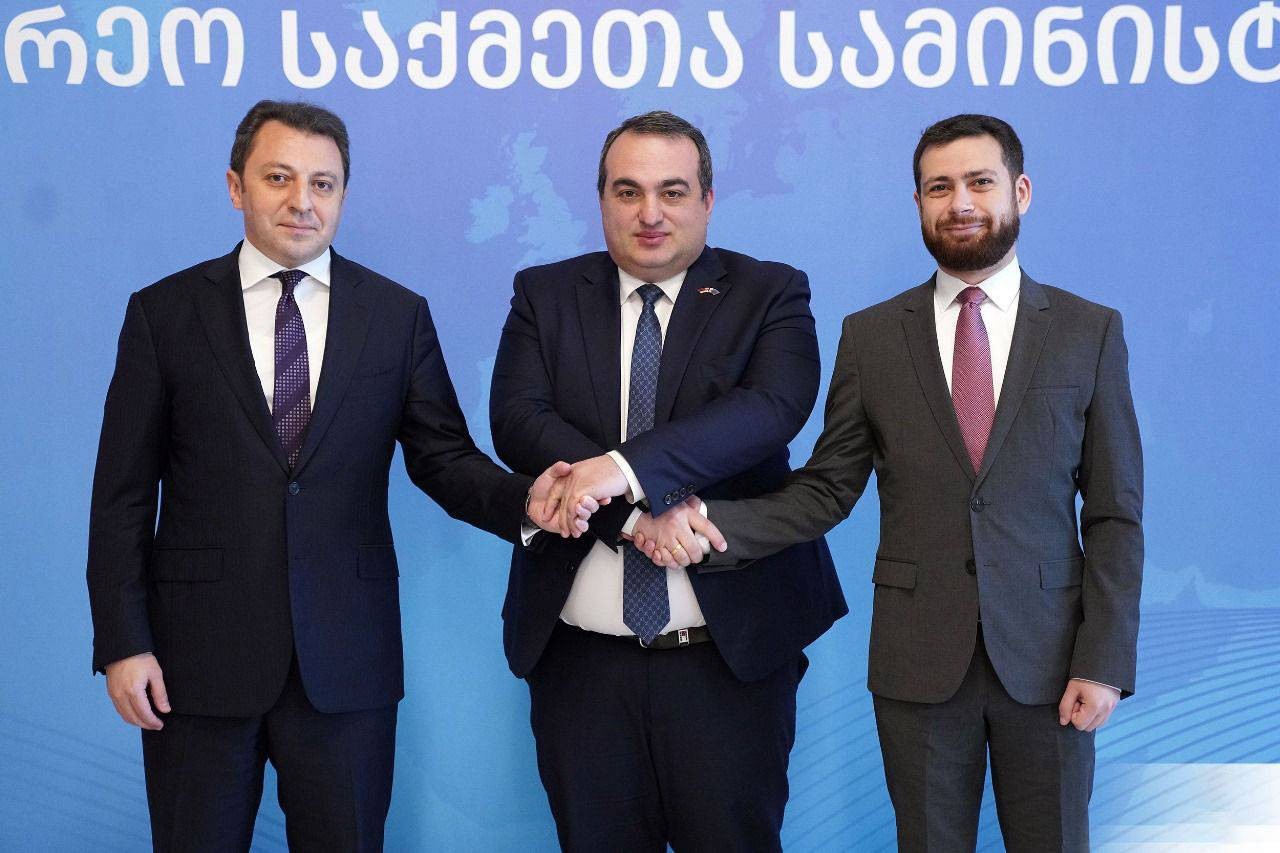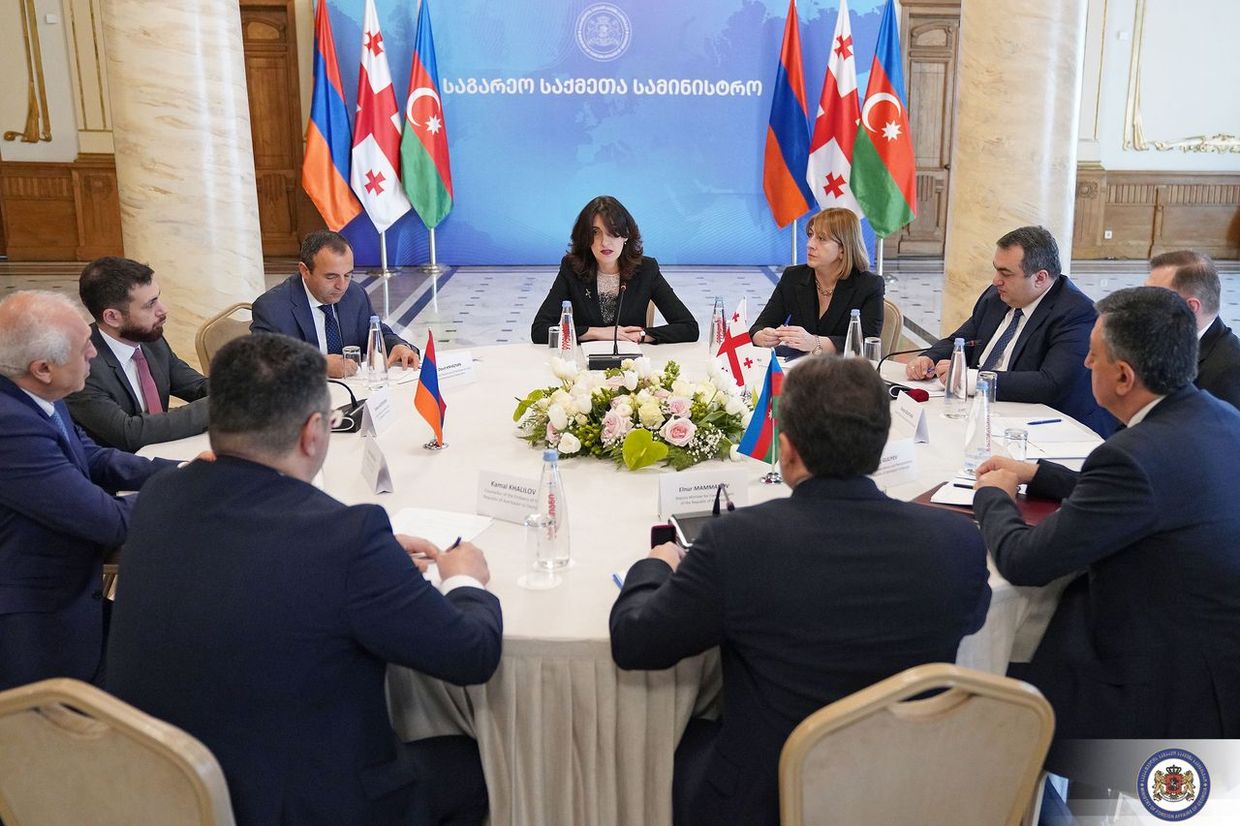
On Thursday, the deputy foreign ministers of Armenia, Azerbaijan, and Georgia — Vahan Kostanyan, Elnur Mammadov, and Lasha Darsalia, respectively — met in Tbilisi. A statement released after the fact said that the meeting was ‘regarded as an initial phase designed to build trust and pave the way for the eventual advancement of the dialogue to a higher level’.
Prior to the meeting, there were high-level talks between officials of the three countries.
On Wednesday, during a trip to Azerbaijan, his first state visit abroad, Georgian President Mikheil Kavelashvili met with Azerbaijani President Ilham Aliyev in Baku. Before that, on 12 April, a panel discussion was held on the sidelines of the Antalya Diplomacy Forum, with the participation of the foreign ministers of the three South Caucasus countries.
The Antalya forum also featured a bilateral meeting between Armenian and Azerbaijani foreign ministers Ararat Mirzoyan and Jeyhun Bayramov, the first such meeting since 13 March, when the two countries announced they had agreed on the text of the peace treaty.
The joint statement of the Thursday meeting stated that it was an initiative of Georgian Foreign Minister Maka Botchorishvili along with Mirzoyan and Bayramov.
The Georgian Foreign Ministry reported that the meeting was opened with remarks from Botchorishvili, expressing Georgia’s ‘genuine desire to advance regional cooperation and to identify common interests’.
Calling the South Caucasus ‘a region of strategic importance, with immense potential’, from which all sides could ‘jointly benefit’, Botchorishvili added that ‘sharing our visions of the region and exploring possibilities for trilateral cooperation is both — very timely and very much needed’.

The joint statement also noted that the participants ‘acknowledged that three countries have untapped potential of cooperation based on full respect for each other’s sovereignty and territorial integrity’.
The statement gave a general overview of the agenda, suggesting that it ‘sought to advance trilateral cooperation across the areas of common interest, with the goal to foster sustainable growth and prosperity in the region’.
It was also noted that the collaboration ‘could facilitate addressing common challenges and ultimately contribute to long-term stability and swift development of the South Caucasus region’.
‘The meeting served as an open exchange of views and presentation of visions on potential areas for collaboration’, the statement read.
The Georgian Foreign Ministry also underscored that the trilateral meeting ‘neither contradicts nor replaces any existing formats of cooperation’ — ‘rather, it represents an additional effort by the three neighbouring countries to establish constructive and mutually beneficial engagement’.
On the same day, Azerbaijani pro-government media APA reported that Bayramov had elaborated on the agenda of the meeting, underscoring that the issues on the agenda were not ‘bilateral topics’.
‘Without addressing the open issues between us, we are discussing matters of common interest. Transboundary rivers and several other topics will be on the agenda today’, Bayramov said, assessing the organisation of such a platform ‘as a positive development’.
Azerbaijan says it wants ‘truly unhindered’ passage through Armenia
On the bilateral track, Armenia and Azerbaijan seem to be far from signing the peace treaty, despite the effective conclusion of the negotiations on the text of the peace treaty on 13 March.
On the same day of the trilateral meeting, Bayramov reiterated Baku’s demand for the so-called ‘Zangezur corridor’, an Azerbaijani proposal to establish a transit link between mainland Azerbaijan and its exclave of Nakhchivan.
Bayramov’s Thursday statement apparently marked a new tone, with him saying that in addition to opening general communications, ‘Azerbaijan requires a special approach to establishing a connection between the western regions and Nakhchivan’.
‘This is because there cannot be a situation where one country is split into two parts’, Bayramov said. He noted that the passage ‘must be truly unhindered, with no obstacles’.
The statement came the day after Armenian Prime Minister Nikol Pashinyan, in a press briefing, recalled Armenia’s proposal to Azerbaijan for the opening of the railway connection for cargo shipments.
Before that, Mirzoyan said in an interview with Turkish media during the Antalya Diplomacy Forum held 11–13 April that there are concerns from Armenia that Azerbaijan ‘do[es] not want to finalise the normalisation, they don’t want to finalise the negotiations to sign the peace treaty’.
Mirzoyan additionally noted that Azerbaijan gave ‘no positive response’, to Armenia’s ‘very tangible and solid proposals’ regarding connectivity issues, mutual verification and arms control.
‘Moreover, we also, from time to time, see the signs of escalation on the ground. We see this escalation in the rhetoric of Azerbaijani leadership, and unfortunately we see that this escalation has the potential to become an escalation on the ground as well’, Mirzoyan said.











